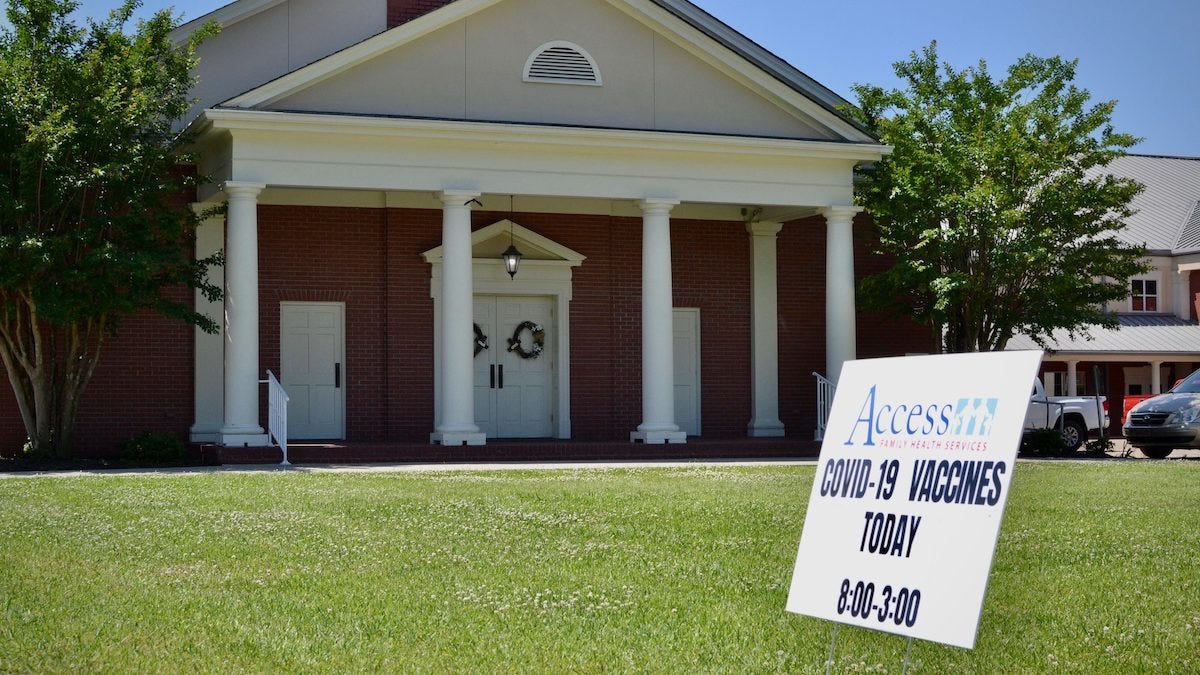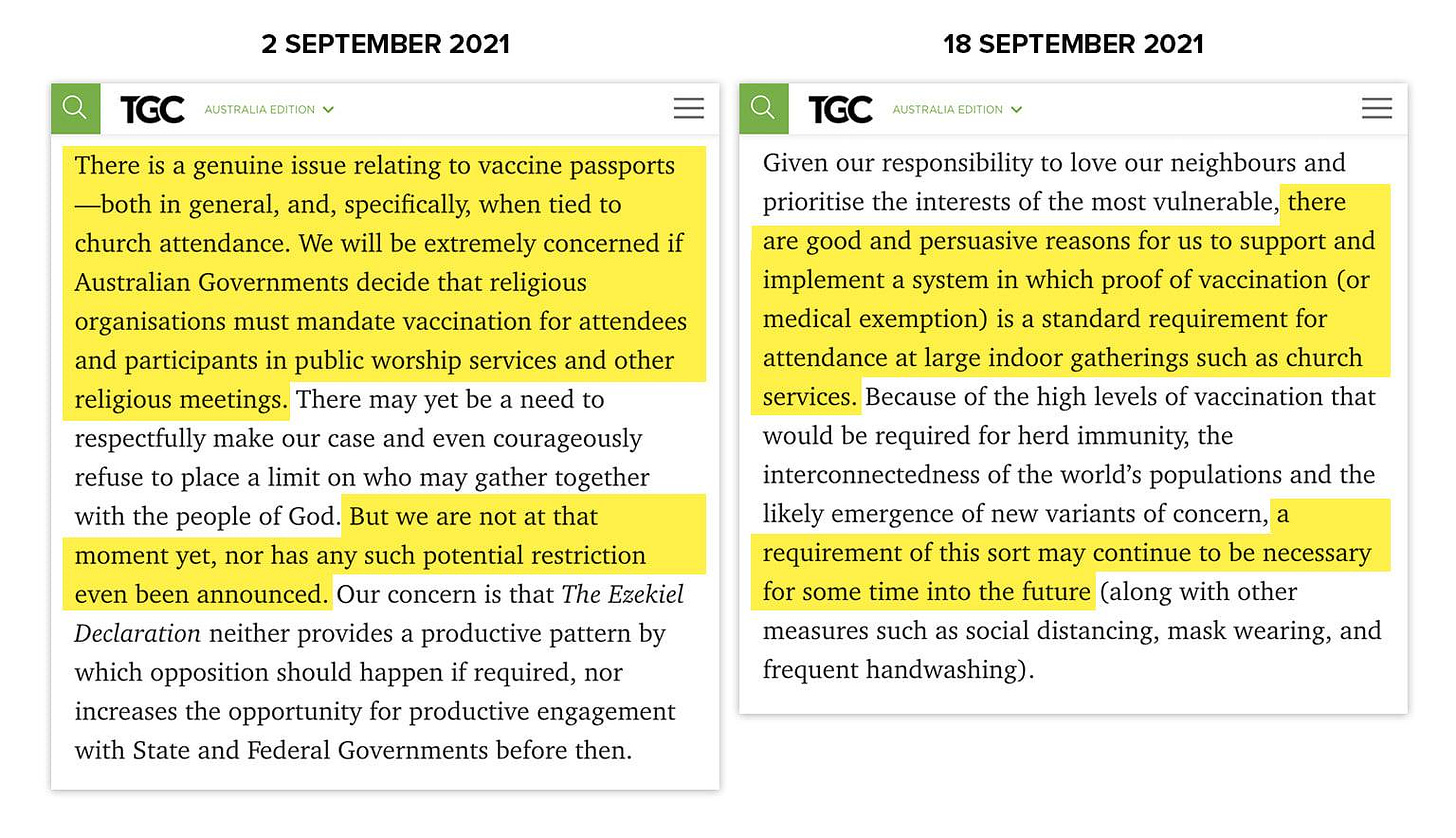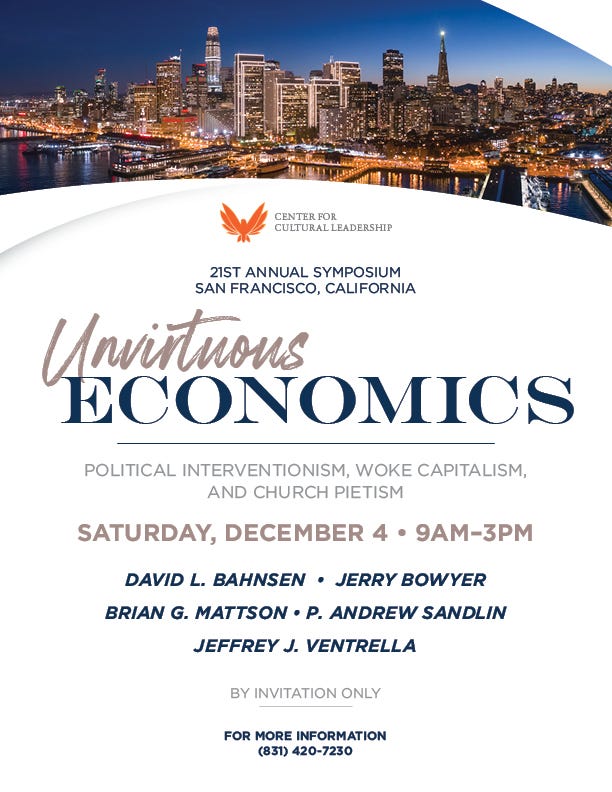Vaccine Mandates or the Biblical Gospel?
Everyone who belongs to Jesus Christ belongs to (or should belong to, and may not be excluded from) the church. To exclude on any other criterion is to subvert the gospel.
Dear friends and supporters,
In my recent essay “Vaccine Mandates and Crony Statism” I addressed the socio-cultural dimension of Covid vaccine mandates. Today I wish to focus attention exclusively on their relation to the church. I was spurred to this essay by my good friend Pastor Eric Anderson’s juxtaposition of two recent statements from the Australian iteration of The Gospel Coalition. Here they are:
The decisive shift over a short 16 days from “extreme concern” if the Australian government mandates vaccination for large indoor gatherings (including church) to “responsibility to love of neighbors” that requires the church demand vaccinations (or medical exemption) for attendance is not the most disturbing aspect of these statements. About-faces under the pressure of statism is an evangelical par for the course.
Rather, the greatest problem is the potential of this church policy to undermine the gospel of Jesus Christ. Because this is a severe verdict, it demands an explanation.
The Exclusive Distinction
The chief stamp of the gospel, and therefore, membership in Christ body, the church, is the single exclusive distinction of covenant union with the crucified and risen Lord. This was the hotly contested issue in Paul’s mail to the Galatians, and we must not allow necessary Reformation-era battles over justification by faith to obscure the underlying issue. In fact, Paul’s dogged assertion of justification by faith alone was necessary precisely in order to preserve the deeper and more fundamental principle: that the only distinction in God’s gospel community is between those united to Christ and, as such, a member of his covenant body — and those who are not.
Of course, faith is vital because it is the exclusive means by which we appropriate that justification; but the theme of Galatians (like Hebrews) is the all-sufficiency of Jesus Christ, meaning: nothing else is necessary. And anything else is fatal.
The only status both necessary and sufficient is union with Jesus Christ, and not socio-economic status, sex, race, nation, intellectual capacity, or anything else. That’s the entire point of Paul statement in Galatians 3:26–28,
For you are all sons of God through faith in Christ Jesus. For as many of you as were baptized into Christ have put on Christ. There is neither Jew nor Greek, there is neither slave nor free, there is neither male nor female; for you are all one in Christ Jesus.
Notwithstanding saccharine theologizing by today’s Leftists and fellow-traveling evangelicals, this passage is not a modern egalitarian credo. Rather, it is a statement about the exclusive distinguishing mark of the gospel and, therefore, the church: union with Jesus Christ. That is the distinction, and there are no other distinctions.
The Galatian Error
False teachers in Galatia had been seducing the flock with the poisonous soteriology that, in addition to union with Christ, one must adhere to the external codes of the old covenant typified in circumcision. For Paul, Christ alone is the exclusive, distinguishing feature of the church, and baptism the external mark of that distinction. The Old Testament never taught differently, and the old covenant had always carried (in the words of Walter Kaiser) a “built-in expiration date.” In breaking with the old covenant Paul was affirming Old Testament prophecy. The new covenant is Old Testament truth.
Therefore, to add other distinctions to the gospel is, according to Paul, to invite God’s severest curse. In fact, aside from our Lord’s curse to those who prohibit little children from coming to him (Mt. 18:6), there’s probably no greater curse pronounced in the entire Bible:
I marvel that you are turning away so soon from Him who called you in the grace of Christ, to a different gospel, which is not another; but there are some who trouble you and want to pervert the gospel of Christ. But even if we, or an angel from heaven, preach any other gospel to you than what we have preached to you, let him be accursed. As we have said before, so now I say again, if anyone preaches any other gospel to you than what you have received, let him be accursed. (Gal. 1:6–9)
We know from Paul’s assertions in Romans 4, Ephesians 2, Titus 3 and elsewhere that salvation is not by works. It is by faith alone. We do not earn or merit eternal life; it is a gift God bestows on undeserving sinners. Our faith appropriates that gift, and that faith itself is a gift.
But Galatians is vital to this discussion of salvation by grace through faith because it offers the most striking example in the Bible of what an attempt at salvation by works looks like. And the answer is: adding distinctions to the gospel and, therefore, the church, besides union with Jesus Christ. Anything that distracts from that Christic union undermines the gospel and the church: The assembly may never be limited to men (or women), white (or black), adult (or child), rich (or poor), educated (or uneducated), American (or non-American) … vaccinated (or unvaccinated).
The assembly is limited to the covenant seed of Abraham, those united to Christ by faith and visibly marked out by baptism, and this is the only limitation.
(continued below)
We hear that COVID-19 has dramatically overturned our lives, but it would be more accurate to assert that the human response to it, particularly the political response, has overturned our lives. There is no question that had there not been such drastic political intervention into human lives and liberty (individual, religious, political, and economic liberty), there would still have been serious cultural hardships, but it is far from evident that those hardships would have exceeded those that the political coercion in the form of executive (non-legislative) orders unleashed.
The short chapters and interviews in this book purport to offer an unapologetically Christian analysis, not so much of coronavirus, but of the prominent human response to it.
Order the e-book here.
(continued)
The Church Is the Assembly
What does this have to do with the vaccine mandates for church attendance? Plenty. Because the church is the ecclesia, the called-out (local) assembly, to attend the church is to be a part of the ecclesia. The assembly is the church. The church is not a gnostic subset hidden within the assembly.
Of course, even Paul recognizes that sometimes unbelievers attend the assembly (1 Cor. 14:23), but, strange as it might sound today, this exception is of almost no concern of the New Testament writers. For them, to attend the assembly is to be part of the church. For unbelievers to be a part of assembly is simply not normative Christianity, though it might sometimes occur.
This sounds strange to modern Christians because we are apt to look at the church as a spectator sport, and the assembly as an indiscriminate public meeting in which the fans admire and cheer for their professional team (worship team, teachers, pastors). But in the apostolic era, ecclesia = congregation, and William Tyndale translated it that way in the first English New Testament. Ecclesia is not an arena hosting a sporting event (like Madison Square Garden) but the assembly of blood-washed saints.
To be part of the church ( = assembly) is to be part of the distinctive people of God, whose only distinction is union with Christ, visibly marked out by baptism.[1]
Objection
To require an additional distinction — like a vaccine passport — to the assembly is to diminish the church’s exclusive distinction: “In Christ alone.” This means that the policy implemented by the Australian Gospel Coalition threatens to subvert the gospel of Jesus Christ.
Howls of outrage and opposition at this suggestion are no substitute for an argument. For example, one right counter, “This is scandalous. Demanding vaccination for attendance is merely a pragmatic matter. It has nothing to do with the gospel.”
But the church is the gospel community, and union with the gospel normatively means union with the church, Christ’s body, his assembly. We may not add requirements to the gospel, and, therefore, we may not add requirements to the assembling ( = the church), the exclusive gospel community. Similarly, we may not exclude from the church except on a strict biblical basis. That is what is termed “excommunication.” It is the judicial exclusion from the gospel after due process (Mt. 18:15–17). There are no other bases for exclusion.
Let me put this in a more positive way: everyone who belongs to Jesus Christ belongs to (or should belong to, and may not be excluded from) the church. To exclude on any other criterion is to subvert the gospel.
One reason some evangelicals are willing to capitulate to this vaccine-mandate statism and establish it as a gospel-subverting criterion for the church is a diminished ecclesiology (see “We Are the Hollow Church”). For them, it seems the gospel floats gnostically or ethereally above the church, not a part of its very bones and sinew and assembly, and the church simply tries to reach up to bring the gospel into its bosom. The church is not the gospel assembly, but a weekly evangelistic crusade.
Kingdom and Church
Make no mistake: although the kingdom is wider than the church (see “First, the Kingdom”), and the gospel is preached far beyond the walls of the church, the church is the exclusive gospel community. The church is not a creational community. Had there never been a fall, there would never have been a church, at least not a church like the one we know. There would, however, be a family. Two other principal divine institutions, the family and the state, are not inherently gospel institutions, though all three (church, family, and state) must be shaped by the word of God.
The church, however, is an inherent and exclusive gospel institution, the guardian of orthodoxy with exclusive monopoly on the sacraments, or ordinances. There is no category for Christians who routinely and persistently stand outside the church community. The church is the exclusive gospel community, and to be excluded from the church is to be excluded from the benefits of the gospel. This is why exclusion — whether self-exclusion or excommunication — is so dire. And an assault on the gospel, well-intentioned though it may be.
Conclusion
None of this is to suggest that the church may flout God’s law forbidding presumption in testing the Lord’s protective grace (Dt. 6:16). God’s common grace has disclosed wise precautions in times of contagion: personal hygiene, cautious bodily contact, and medications, including demonstrably effective vaccines. But common-grace wisdom may never conflict with biblical-law requirements — and one requirement is that no believer may be banned from the church ( = attendance) unless duly excommunicated.
The fact that this issue is deemed adiaphoron, a matter of indifference, exhibits another reason the modern church is so spiritually enfeebled. Although the requirement of vaccination in today’s church is not as dire as the requirement of circumcision in the early new covenant community, any addition to the single requirement of union with the crucified and risen Lord by faith alone undermines the gospel.
To be blunt: if your church requires proof of vaccination for attendance, it subverts the gospel truth that union with Christ is the only criterion for inclusion in the church, exhibited by attendance in the assembly.
[1] This does not mean that works or obedience do not mark the believer. But they are an essential result of union with Christ, just as justification is. Union with Christ is the key soteric fact. See John Murray, Redemption Accomplished and Applied.
Will you consider a tax-deductible donation to CCL via PayPal or Venmo? Or mail a check to CCL, Box 100, Coulterville, CA 95311. God uses you to keep us going — and expanding.
Personal
I’m in Texas attending a National Review event and visiting my dear friend David W. Souther.
Next Sunday, October 31 (adult Sunday school) and November 7 (worship service) I’ll be speaking at City Church, Corpus Christi, Texas. I hope to see many of you Texas friends there. The sermons will be live-streamed.
Almost all the chapters are in hand for Failed Church: Restoring a Vision of Ecclesial Victory. These seventeen chapters from faithful men of God and incisive thinkers bristle with sobering analysis and biblical direction for a return to fidelity in our deeply unfaithful ecclesial situation.
When I get home I’ll be gearing up for the 21st annual CCL symposium. A few spots are left. Contact me if you wish to attend.
Thank you for your kind friendship, prayer, and support.
Yours with gratitude,
Founder & President, Center for Cultural Leadership
More great stuff:
The Center for Cultural Leadership site is here.
My Amazon author page (print and digital) is here.
You can find my sermons and lectures at my YouTube channel.
Sign up to get my blog updates here.
Here’s my Twitter feed.
If you want to get the free exclusive hard copy publication Christian Culture, please send me a Facebook private message.
The CCL phone number is 831-420-7230.
The mailing address is:
Center for Cultural Leadership









